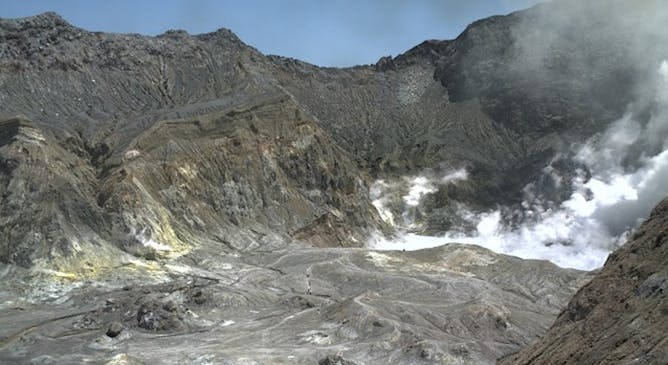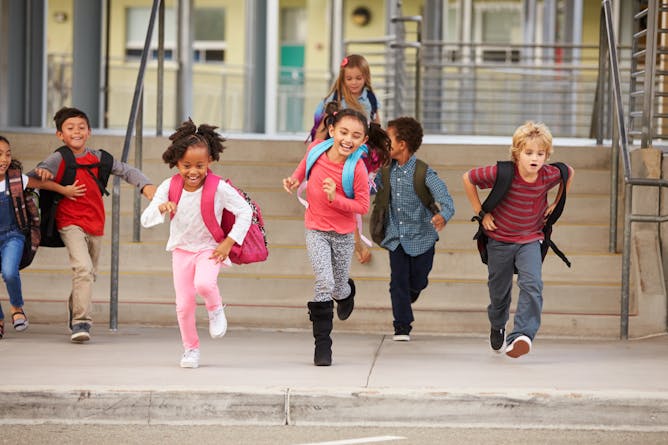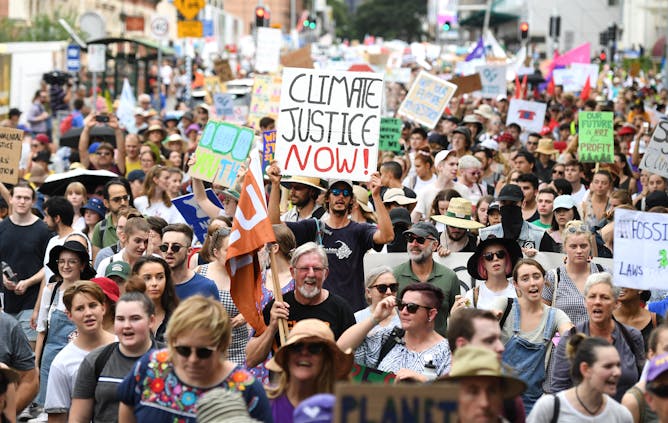|
|
|
Editor's note
|
|
The people visiting White Island on Monday afternoon when the volcano erupted were tourists and tour guides from Australia, the UK, China and Malaysia, along with New Zealanders. Many have questioned what they were doing there, especially given the volcanic alert level for White Island had been raised a few days earlier because of “moderate and heightened volcanic unrest”.
The decision to take visitors to the privately owned island ultimately lies with tour operators. Tourism expert Michael Lueck writes today that it might be time for the tourism industry, government and volcanic experts to review the current rules.
|
Veronika Meduna
New Zealand Editor
|

|
|
Top stories
|

The volcanic alert level on Whakaari/White Island remains at three, one rung higher than it was when the eruption took place.
AAP/GNS Science
Michael Lueck, Auckland University of Technology
Visiting an active volcano involves risk. Hazard monitoring systems can issue warnings but in the case of the privately-owned White Island, the decision to take a tour falls to tourism operators.
|

Those facing large price increases might drop or downgrade their cover.
Wayhome studio/Shutterstock
Nathan Kettlewell, University of Technology Sydney
In April, private health insurance premiums will increase by an average of 2.92%. It's the lowest rise in 19 years but still much higher than wages growth. And insurers still make a healthy profit.
|

Every child progresses at different levels, just like everyone learns to talk and walk at different times.
from shutterstock.com
Jenny Johnston, Southern Cross University
Generally speaking, if your English-speaking child is at least six years old by the end of the year, there are some standard things they should know and be able to do.
|

One of this year’s most refreshing developments was the youth-led action on climate change.
AAP Image/Dan Peled
Elaine Pearson, UNSW; Louise Chappell, UNSW
From mass climate change movements to cultural genocide of Uighurs in China, here are some of the headline human rights moments that captured Australia’s attention.
|
Politics + Society
|
-
Genna Churches, UNSW; Monika Zalnieriute, UNSW
Australia still uses a law from 1979 to govern metadata, with more than 100 amendments. This leaves loopholes that various agencies can exploit and dodge safeguards.
|
|
Science + Technology
|
-
Cameron Webb, University of Sydney; Craig Williams, University of South Australia; Larissa Braz Sousa, University of South Australia; Seamus Doherty, University of South Australia; Stephen Rober Fricker, University of South Australia
Nuisance-biting and mosquito-borne disease are ongoing concerns for health authorities. But an effective citizen science program is now showing how all of us can help beat the bite of mozzies.
-
Celine Boehm, University of Sydney; Tibor Kibedi, Australian National University
A recent experiment with atomic nuclei is hard to square with our current understanding of physics.
|
|
Business + Economy
|
-
Sarah Ann Wheeler, University of Adelaide
Our study predicts a further 0.5℃ increase in temperature by 2041 will halve the current number of farmers in Australia's Murray-Darling Basin
-
John Quiggin, The University of Queensland
Market forces don't work well in education. For-profit businesses are more tempted to exploit loopholes than provide quality service.
|
|
Environment + Energy
|
-
Peter Ellerton, The University of Queensland
The point of an argument can become lost when debating climate change. Greta Thunberg show us how to stay on-topic.
-
Jeff Seadon, Auckland University of Technology
Burning non-recyclable waste to generate energy sounds like a great idea – but incineration plants need an ongoing waste stream to be viable, which perpetuates the make-use-dispose mentality.
-
Ryan R. Witt, University of Newcastle; Chad T. Beranek, University of Newcastle; John Clulow, University of Newcastle; John Rodger, University of Newcastle; Lachlan G. Howell, University of Newcastle; Robert Scanlon, University of Newcastle
Unprecedented fires are devastating koalas along Australia's east coast. These sudden drops in population put the survivors at risk of inbreeding.
-
Daniel Connell, Crawford School of Public Policy, Australian National University
The Nationals have stoked opposition to the Murray Darling Basin Plan at every opportunity. Now they cannot contain the fury of rural voters.
|
|
Arts + Culture
|
-
Chari Larsson, Griffith University
Water can give and water can take. Without it, however, we are nothing. A new exhibition presents a nuanced and gentle provocation as we grapple with drought and climate change.
-
Lachlan Warner, Australian Catholic University
Why are we so surprised that artists are also demanding changes to the way prizes are awarded?
|
|
Cities
|
-
Andrew Butt, RMIT University; Crystal Legacy, University of Melbourne; Gerry McLoughlin, Swinburne University of Technology; Ian Woodcock, Swinburne University of Technology
Public protests eventually forced the scrapping of some proposed freeways in 1973. Today, we have another round of projects and people are protesting again, with good reason. Government should listen.
|
|
Health + Medicine
|
-
Abishek Santhakumar, Charles Sturt University
When you hurt yourself, tiny blood vessels can break under the skin. The blood that oozes out is what gives a bruise its colour.
|
|
| |
Featured jobs
|

|
University of Melbourne — Parkville, Victoria
|

|
La Trobe University — Bundoora, Victoria
|

|
Swinburne University of Technology — Hawthorn, Victoria
|

|
RMIT University — Melbourne, Victoria
|
|
|
|
Featured events
|

|
Kolling Institute of Medical Research, Kolling Auditorium, Level 5, Building 6, Royal North Shore Hospital, 10 Westbourne Street , St Leonards, New South Wales, 2064, Australia — University of Sydney
|
|
|
|
| |
| |
| |
| |
| |
|
|
|
|
|
|
|